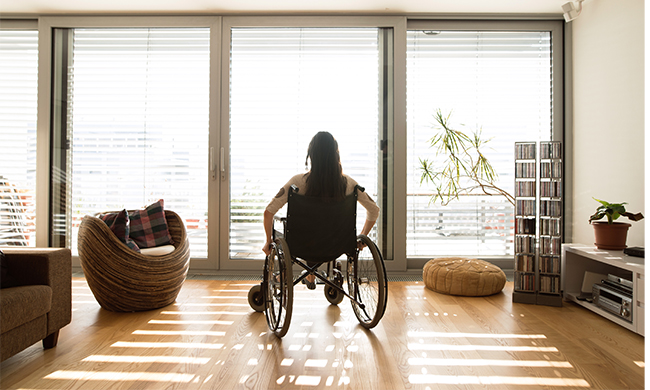VICTORIA OLIVER on the lack of awareness about the menopause – and how it affects women with spinal cord injuries
My name is Victoria and within the next 10 years I will most likely experience the menopause. Yet until recently I knew little about this important stage in my life. Thankfully a recent webinar hosted by Sucheta Iyengar, Consultant in Obstetrics and Gynaecology and Specialist in Menopause Care, opened my eyes.
Sucheta’s webinar was part of a series my firm, Bolt Burdon Kemp, ran entitled “Menstruation to Menopause – a SCI Woman’s Journey”. Looking at puberty; sex; parenting; ageing and finally – the menopause.
Our aim was to provide SCI women with information that is sadly often lacking within their rehabilitation journey and also to break the silence surrounding these topics which are frequently, incorrectly, seen as embarrassing or ‘taboo’.
I personally still find it odd that as a society we recognise the importance of educating girls on what happens when their periods start but do not recognise the importance of educating women and those that support them on what happens when their periods end.
The title of this short article refers to “The Lost Tribe”. This is a reference to the fact that whilst there are studies about the menopause (albeit not enough!) there are barely any studies surrounding the menopause amongst SCI women.
Those that do exist are 20 years old and were undertaken in America and Canada where healthcare and lifestyle can differ. Sucheta has found one study done at Stoke Mandeville hospital looking at the use of HRT in women with SCI, published in 2005 but it is the only UK study she has found to date.
Sucheta’s experience shows that the menopause affects all women differently; unsurprising really given that there are between 60-70 symptoms that women can experience. For women with SCI there are some additional aspects to consider:
- the average age of menopause for women in the UK is 51 years however that figure drops in women with SCI to 43.5 years. So SCI women need to be aware of the possible impact of the menopause a lot sooner than the ‘average’ woman;
- diagnosing the menopause is not always easy. For women with SCI there is the added complication that many of the symptoms of menopause can be similar to many of the secondary complications of SCI. SCI can impact mood, sex drive and arousal; also vaginal dryness. All potential symptoms of the menopause. Additionally sweating and increase in temperature are indicators of autonomic dysreflexia (“AD”); a very serious condition affecting higher level SCI. They are also common symptoms of menopause. Similarly, headaches could be due to reduced levels of estrogen as found in the menopause but can also be a symptom of AD if the injury is above T6.
For those SCI Women who are either going through the menopause or may experience this in the next few years, Sucheta has the following advice:
“As mentioned above the type and severity of symptoms SCI women may suffer can differ depending on whether they have paraplegia or tetraplegia, and the completeness of their injury. These symptoms can be misinterpreted both by women and also health care professionals. Women with SCI often know themselves and their body after injury the best, so by being aware of various possible symptoms of the menopause, ruling out other causes can help them realise that these could be due to the menopause and not SCI.
“Awareness of long term effects such as osteoporosis and cardiovascular disease seen in all women is also important; and more so in women with SCI. Immobilisation can cause reduced bone density with increased risk of fractures. The risk-benefit ratio of Hormone replacement therapy is therefore different and complex and recent studies in ‘able-bodied’ women have shown that HRT started around the menopause can have beneficial effects on both of these conditions; but more research is needed; especially in women with SCI.
“Websites such as www.womens-health-concern.org are reputable, providing accurate and up to date information; although there is no information specifically for women with SCI; the treatment options available would apply to all; and women should discuss this with their local gynaecologist/ spinal care consultant/ menopause specialist so they can get the treatment best suited to them.
Decision to take medication, whether hormonal or non-hormonal, is an individual, and educated choice.”
As a tribe SCI women’s voices are being lost. This is something that Sucheta hopes to remedy in the future by promoting more studies and we are fully behind her!
Victoria Oliver is a Senior Associate and Head of the Spinal Injury team at Bolt Burdon Kemp
Sucheta Iyengar, is a Consultant in Obstetrics and Gynaecology and a Specialist in Menopause Care


